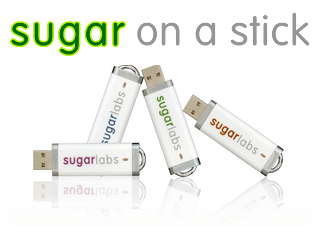Difference between revisions of "Sugar on a Stick/Downloads"
Martinwguy (talk | contribs) |
|||
| Line 6: | Line 6: | ||
Sugar on a Stick will run on | Sugar on a Stick will run on | ||
| − | * any Notebook, Laptop, or Desktop computer, with a minimum of 1GB RAM, that can run Linux, Windows or macOS, using a USB thumbdrive or stick, as a [[wikipedia:Live USB|Live USB]], | + | * any 64-bit Notebook, Laptop, or Desktop computer, with a minimum of 1GB RAM, that can run Linux, Windows or macOS, using a USB thumbdrive or stick, as a [[wikipedia:Live USB|Live USB]], |
* a Raspberry Pi 2 or 3, using a microSD card<!-- it is not a Live system, but an installed system-->, or; | * a Raspberry Pi 2 or 3, using a microSD card<!-- it is not a Live system, but an installed system-->, or; | ||
* any computer as a virtual machine. | * any computer as a virtual machine. | ||
Revision as of 08:25, 15 January 2021
Project Home · Get Involved · Contacts · Resources · FAQ · Roadmap · To Do · Meetings
| Sugar on a Stick is a Fedora® Spin operating system featuring the award-winning Sugar Learning Platform.
Sugar on a Stick will run on
You can use Sugar on a Stick to demo Sugar almost anywhere without disturbing the contents of the computer you use, and if people like what they see, you can install Sugar on a Stick to their hard drives or other sticks from the demo stick.
Our most recent working version of Sugar on a Stick was released on 28 April 2020 with Fedora 32. (Unfortunately, SoaS 33 suffers from a startup problem and this problem has been fixed but they'll be no new image until SoaS34 when Fedora34 is released, you can download this rawhide image for testing.) A more recent version of Sugar is available on the TOAST version of Sugar (Trisquel on a Sugar Toast). See Trisquel On A Sugar Toast. | ||
|
| ||
|
| ||
|
See also;
| ||
|
See the Spins download page
|
||
Fedora and the Infinity design logo are trademarks of Red Hat, Inc.

